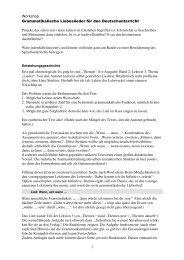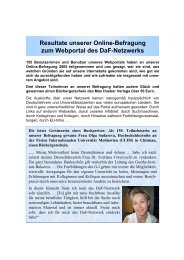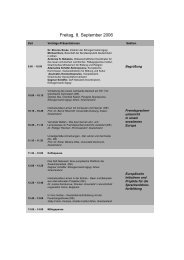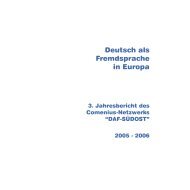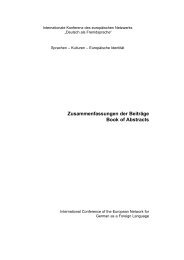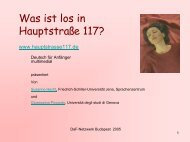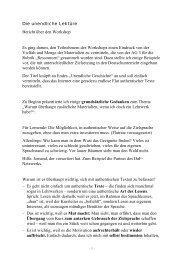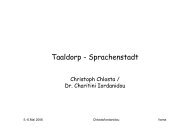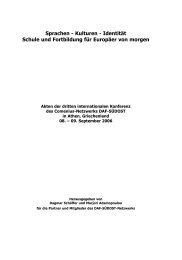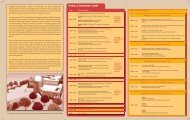Fremdsprache Deutsch Europäisch - DaF Netzwerk
Fremdsprache Deutsch Europäisch - DaF Netzwerk
Fremdsprache Deutsch Europäisch - DaF Netzwerk
Sie wollen auch ein ePaper? Erhöhen Sie die Reichweite Ihrer Titel.
YUMPU macht aus Druck-PDFs automatisch weboptimierte ePaper, die Google liebt.
182<br />
<strong>Fremdsprache</strong> <strong>Deutsch</strong> <strong>Europäisch</strong><br />
student teachers)<br />
o Comenius 2.2 – individual training grants<br />
• Comenius 3 – Networks<br />
Under Comenius 1 – school cooperations – three different types of projects might be carried<br />
out: School Projects, Language Projects, School Development Projects.<br />
Main charateristics of Comenius 1 projects:<br />
• Comenius 1 projects are international cooperations. It means that the overall objective<br />
of the projects has to be reached by a series of activities of the partner institutions<br />
that are built upon each other, presupposing each other.<br />
• Jointly chosen themes, a topic of mutual interest<br />
• Continuous communication – communication should be carefully planned, regular<br />
and smooth<br />
• Endproduct – endproducts, outcomes (webpage, exhibition, musical/theatre play,<br />
book, teaching material…) are very important, but the really important thing is that<br />
the whole process (brainstorming, partnerfinding, planning, managing, administrating<br />
the project work as well as realizing the proffessional content and carrying out of a<br />
project with partners from other countries) and the experiences should be integrated<br />
into the daily, everyday routine of the school.<br />
Further info on Comenius 1 school partnerships:<br />
Comenius 1 Handbook for Schools - http://europa.eu.int/comm/education/programmes/<br />
socrates/comenius/tools_en.html<br />
Comenius 2.1 institutional projects work on improving the training of teachers by creating,<br />
delivering, testing, adapting, disseminating training courses, methods, and materials.<br />
It was in 1998 that Hungarian institutions could apply in this action for the first time. Since<br />
than, in the last 6 -7 years, there have been about 100 projects realized with Hungarian participation.<br />
The most popular reasearch fields of these projects were: improving the quality of<br />
the training of (pre-)primary school teachers, early language teaching, teaching of sciences,<br />
environmental education, European citizenship, ICT in education, interculturality – fighting<br />
against racism, xenophobia, and helping the social inclusion of Gipsy children.<br />
In the first years higher educational institutions were over represented among the Hungarian<br />
applicants but today we have quite a few applications submitted by NGOs, research centres,<br />
pedagogical institutions, schools, museums….<br />
Comenius 3- Networks encourages the networking of other Socrates, Comenius projects with<br />
the aim of promoting innovations in school educaion in different thematic fields. Comenius<br />
3 is a fairly new action, it was launched in 2000, in the 2nd phase of the Socrates programme.<br />
We had 15 Comenius 3 projects with Hungarian participation between 2000 and 2005.<br />
• Transnational cooperation,<br />
• Intercultural dimension (partners from different countries with different backgrounds,<br />
different work styles → flexibility is required),



